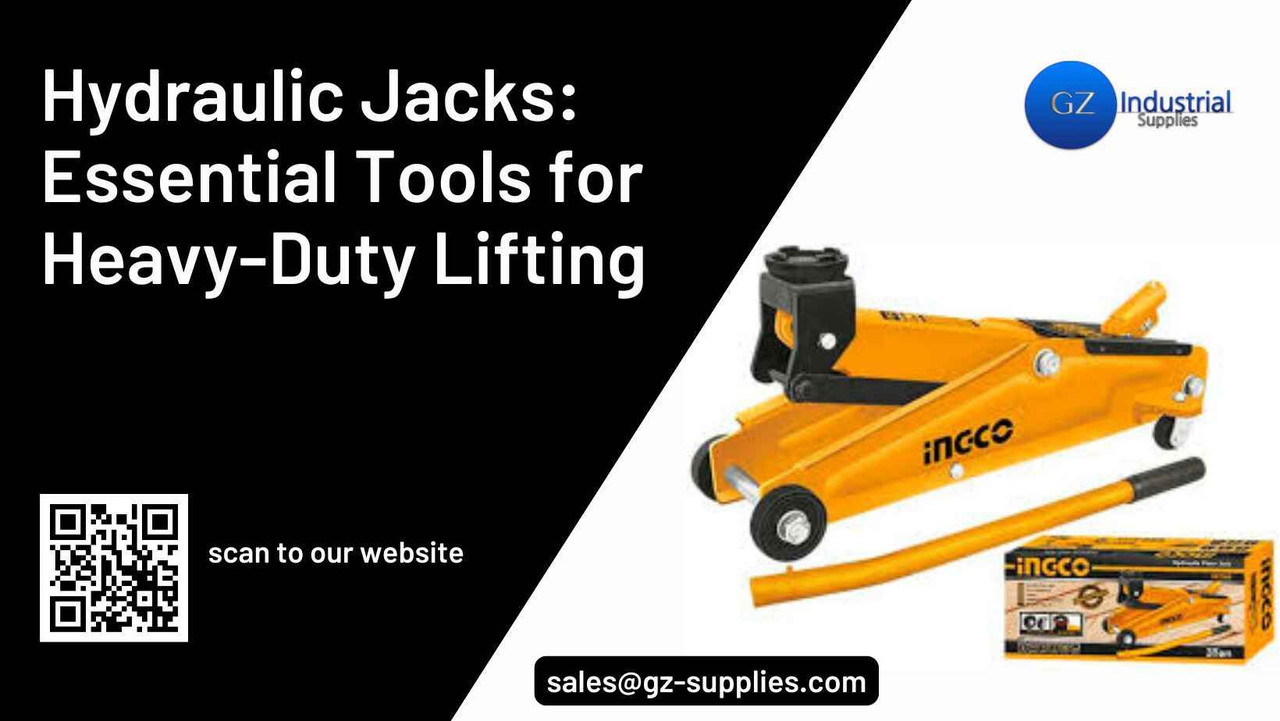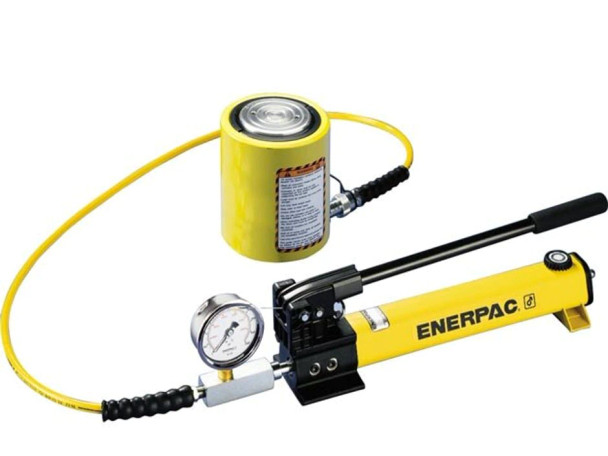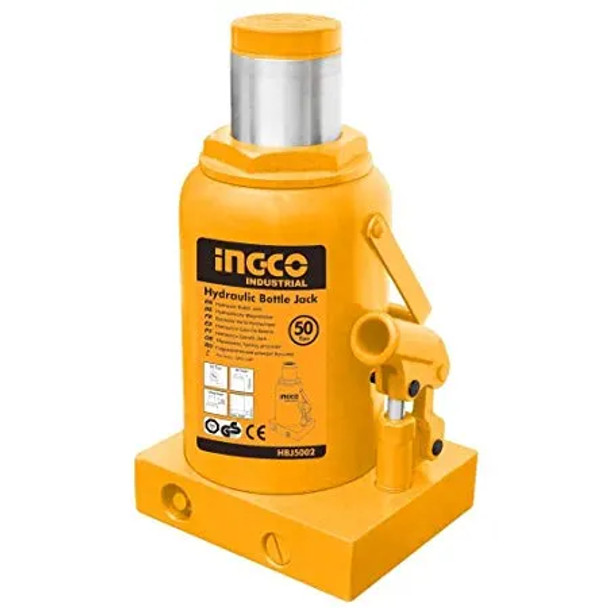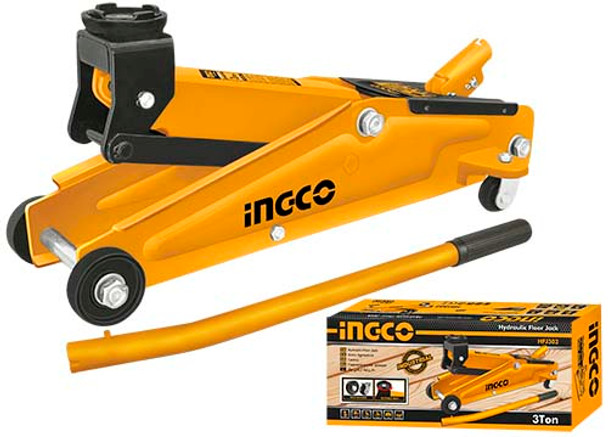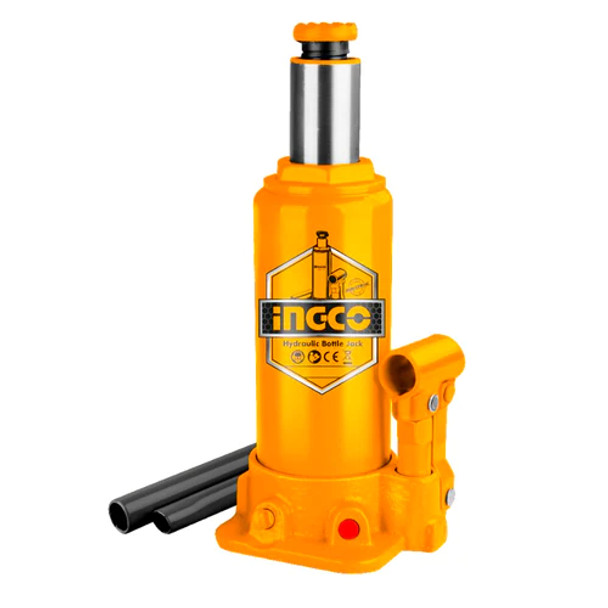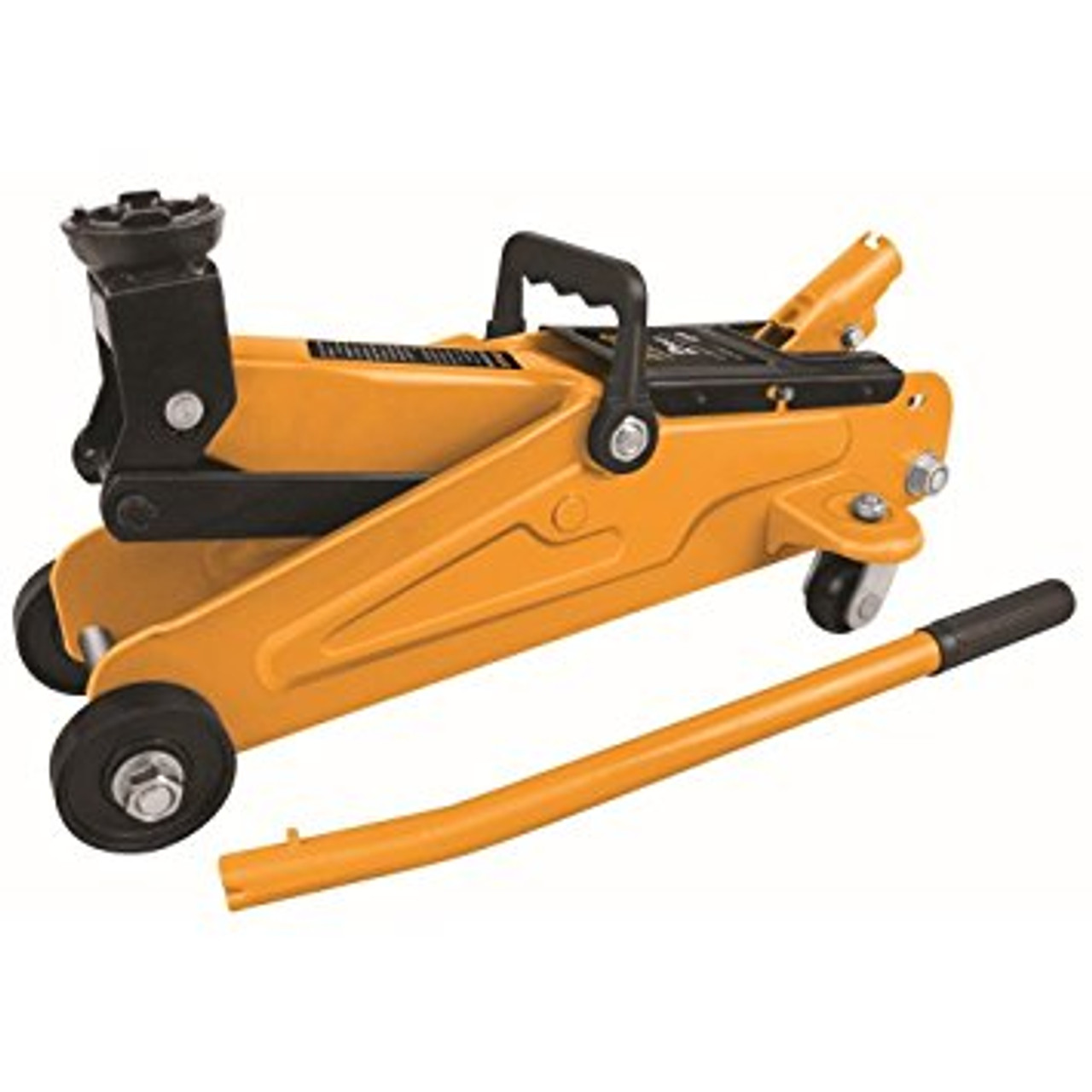Hydraulic Jacks: Essential Tools for Heavy-Duty Lifting
Introduction
Hydraulic jacks are crucial tools for various industries, from automotive and construction to manufacturing and shipbuilding. Designed to lift heavy loads with minimal effort, hydraulic jacks use the principles of fluid mechanics to generate substantial lifting power. Whether it's for repairing vehicles, supporting construction structures, or facilitating industrial machinery maintenance, hydraulic jacks are crucial for ensuring safety and efficiency.
How Hydraulic Jacks Work
Hydraulic jacks operate on Pascal's principle, which states that pressure applied to a confined fluid is transmitted equally in all directions. These jacks consist of a cylinder filled with hydraulic fluid and a pump that generates pressure. When the pump is activated, the fluid is pushed into the cylinder, creating a force that lifts the load. This mechanism allows the jack to lift heavy objects with relatively little manual effort.
Key Components:
- Hydraulic Fluid: Transmits the force within the jack.
- Pump: Used to apply pressure to the hydraulic fluid.
- Cylinder: The chamber where the hydraulic fluid is compressed, resulting in the lifting action.
- Piston: The part that moves up to lift the load as the fluid pressure increases.
ENERPAC 50 Ton Hydraulic Cylinder and Hand Pump Set
Types of Hydraulic Jacks
Understanding the different types of hydraulic jacks is crucial to selecting the right one for a specific task. Here are some common types:
Bottle Jacks:
Known for their compact and portable design, bottle jacks have a vertical cylinder and piston, making them ideal for automotive use, such as lifting cars for repairs. They are available in various lifting capacities, ranging from a few tons to several dozen tons.
Floor Jacks:
Floor jacks have a horizontal cylinder and a longer handle, offering better stability and ease of use for heavy lifting in garages and workshops. They are commonly used for lifting vehicles and equipment in automotive service centers.
Toe Jacks:
Designed to lift heavy objects with low ground clearance, toe jacks have a low-profile toe that fits under the load and a high lifting point on top. These jacks are ideal for lifting machinery, equipment, and loads with limited lifting points.
Hydraulic Press Jacks:
Used for pressing, shaping, or bending materials, these jacks are essential in industrial settings like manufacturing plants and workshops.
Choosing the Right Hydraulic Jack
Selecting the right hydraulic jack depends on several factors, including the type of load, the required lifting height, and the working environment. Here are key considerations:
Load Capacity:
Ensure the jack's rated capacity exceeds the weight of the load you need to lift. Overloading a jack can lead to equipment failure and safety hazards.
Lifting Height:
Choose a jack with sufficient lifting height for your specific application. Bottle jacks offer a higher lifting range, while floor jacks provide better control at lower lifting heights.
Working Environment:
Consider the environment where the jack will be used. For example, toe jacks are suitable for confined spaces, while floor jacks are ideal for open areas like workshops and garages.
Portability:
If you need to move the jack frequently, opt for a lightweight and portable design, such as a bottle jack. For more stationary applications, a floor jack may be more appropriate.
Ingco 50Ton Hydralic Bottle Jack (HBJ5002)
Safety Tips for Using Hydraulic Jacks
Safety is paramount when using hydraulic jacks, as improper use can lead to accidents and injuries. Here are some essential safety tips:
Inspect the Jack:
Before use, inspect the jack for any signs of damage, such as leaks, cracks, or worn-out parts. Never use a jack that appears damaged or malfunctioning.
Use on a Stable Surface:
Always place the jack on a flat and stable surface to prevent tipping or shifting during operation. For vehicles, use wheel chocks to prevent rolling.
Do Not Exceed Capacity:
Never exceed the jack's rated capacity. Overloading can cause the jack to fail and potentially cause injury.
Use Jack Stands:
When lifting vehicles, always use jack stands to support the weight of the vehicle. Never rely solely on the jack to hold the load for extended periods.
Operate Smoothly:
Use smooth and controlled movements when pumping the jack. Avoid rapid or jerky motions, as they can destabilize the load.
Maintenance and Care of Hydraulic Jacks
Regular maintenance is crucial to ensure the longevity and optimal performance of hydraulic jacks. Proper care can prevent unexpected failures and maintain the jack’s efficiency over time. Here are some essential maintenance tips:
Check Hydraulic Fluid:
Regularly inspect the hydraulic fluid level in the jack. Low fluid levels can affect performance and lead to malfunctions. If needed, top up the fluid with the manufacturer-recommended hydraulic oil.
Inspect for Leaks:
Hydraulic jacks rely on a sealed system to function properly. Routinely check for leaks around the cylinder, seals, and pump. If you notice any leaks, address them immediately by replacing worn-out seals or components.
Lubricate Moving Parts:
Lubricate the moving parts, such as the handle and pivot points, to ensure smooth operation. Avoid using too much oil, as excess can attract dirt and debris, leading to wear.
Bleed the Jack:
Air can become trapped in the hydraulic system over time, reducing the jack's lifting capacity. Bleed the jack regularly by opening the release valve and pumping the handle several times to remove any air pockets.
Store Properly:
When not in use, store the jack in an upright position in a dry, clean area. Avoid storing it with the handle or cylinder fully extended, as this can cause stress on the seals and components.
Hydraulic Floor Jack 3Ton INGCO (HFJ302)
Applications of Hydraulic Jacks in Various Industries
Hydraulic jacks are versatile tools used across different industries. Here are some key applications:
Automotive Industry:
Hydraulic jacks are widely used in automotive workshops for lifting vehicles during repairs and maintenance. Mechanics rely on floor jacks and bottle jacks to safely elevate cars, trucks, and other vehicles for tasks such as tire changes, brake repairs, and undercarriage inspections.
Construction:
In construction, hydraulic jacks are essential for lifting and positioning heavy structures, such as steel beams and concrete slabs. Toe jacks are often used for their low-profile design, allowing workers to lift heavy objects with limited ground clearance.
Manufacturing:
Hydraulic press jacks are employed in manufacturing processes for shaping, bending, and pressing metal components. These jacks provide the necessary force to mold materials into the desired shape with precision and accuracy.
Railway and Shipbuilding:
Hydraulic jacks are used in railway maintenance for lifting train cars and in shipbuilding for elevating sections of vessels during assembly and repairs.
Emergency Services:
Rescue operations, such as vehicle extrication during accidents, often utilize hydraulic jacks to lift vehicles and create space for rescuers to reach trapped individuals safely.
Advantages of Hydraulic Jacks
Hydraulic jacks offer several advantages over other types of lifting equipment:
High Lifting Capacity:
Hydraulic jacks can lift significantly heavier loads compared to mechanical jacks, making them suitable for demanding applications.
Precision Control:
The smooth and controlled lifting action of hydraulic jacks allows for precise positioning of heavy loads, which is essential in construction and manufacturing.
Ease of Use:
Hydraulic jacks require minimal physical effort to operate, thanks to their fluid-driven mechanism. This ease of use makes them accessible for both professional and DIY applications.
Durability:
With proper maintenance, hydraulic jacks are highly durable and can withstand heavy-duty use for extended periods.
Ingco Hydraulic bottle jack 20 Ton HBJ2002
Safety Tips When Using Hydraulic Jacks
Using hydraulic jacks safely is crucial to prevent accidents and ensure the safety of both the operator and the equipment. Here are some essential safety tips:
Use on a Stable Surface
: Always place the jack on a flat, stable surface. Uneven or soft ground can cause the jack to tip over or sink, leading to potential accidents.
Never Exceed Capacity:
Each hydraulic jack has a specified weight limit. Never attempt to lift a load that exceeds the jack’s rated capacity, as this can lead to jack failure and potential injury.
Support the Load:
Once the load is lifted, use jack stands or other support mechanisms to secure it. Never rely solely on the hydraulic jack to hold the weight for an extended period.
Check for Damage:
Before each use, inspect the jack for any signs of damage, such as leaks, cracks, or bent components. Do not use the jack if any defects are found.
Use Proper Lifting Points:
Always position the jack under the manufacturer-recommended lifting points on the vehicle or object being lifted. Incorrect positioning can cause damage or instability.
Top Brands and Models of Hydraulic Jacks
Several reputable brands manufacture high-quality hydraulic jacks for various applications. Here are some top brands known for their reliable and durable hydraulic jacks:
Ingco:
Known for producing a range of hydraulic jacks suitable for both professional and home use, Ingco offers durable and high-performance jacks with features such as safety bars and durable construction.
Migcraft:
Migcraft is recognized for its wide range of hydraulic jacks, including bottle jacks, floor jacks, and scissor jacks. Their jacks are known for their robustness and ease of use.
Hellog:
Hellog hydraulic jacks are renowned for their heavy-duty construction and safety features. They offer a variety of jacks with different lifting capacities to suit various needs.
Bosch:
Bosch hydraulic jacks are known for their reliability and durability, making them a popular choice for automotive professionals and DIY enthusiasts.
Hydraulic Floor Jack 2Ton INGCO HKJ201
Frequently Asked Questions (FAQs)
How often should I check the hydraulic fluid in my jack?
It's recommended to check the hydraulic fluid level every few months or after extensive use. Regular checks help ensure the jack operates efficiently and maintains its lifting capacity.
What type of hydraulic fluid should I use in my jack?
Always use the hydraulic fluid specified by the manufacturer of your jack. Using the wrong type of fluid can lead to performance issues or damage to the hydraulic system.
Can I use a hydraulic jack to lift a vehicle for an extended period?
No, hydraulic jacks are designed for lifting and not for long-term support. Always use jack stands or other stable supports to hold the vehicle after lifting.
What should I do if my hydraulic jack is leaking fluid?
If you notice fluid leakage, it's important to inspect the jack for damaged seals or components. Replacing worn-out seals can often fix the leak. If the problem persists, consult a professional for repair or consider replacing the jack.
How do I safely bleed a hydraulic jack?
To bleed a hydraulic jack, open the release valve and pump the handle several times to remove trapped air. Close the release valve and test the jack's performance. Consult the manufacturer's instructions for specific bleeding procedures.
Related Article
How to Select the Best Hydraulic Jack for Industrial Use
Conclusion
Hydraulic jacks are tools for heavy-duty lifting across various industries. If you're in need of high-quality hydraulic jacks or maintenance supplies, visit GZ Industrial Supplies. Our extensive range of hydraulic jacks is designed to meet your specific lifting needs, whether for automotive, construction, or industrial applications. Our team of experts is here to assist you in choosing the right equipment to ensure safety, durability, and optimal performance.
Upgrade your lifting tools today with GZ Industrial Supplies, your trusted partner for all heavy-duty equipment needs. Visit our website or contact us for more information on our range of hydraulic jacks and other industrial supplies.

